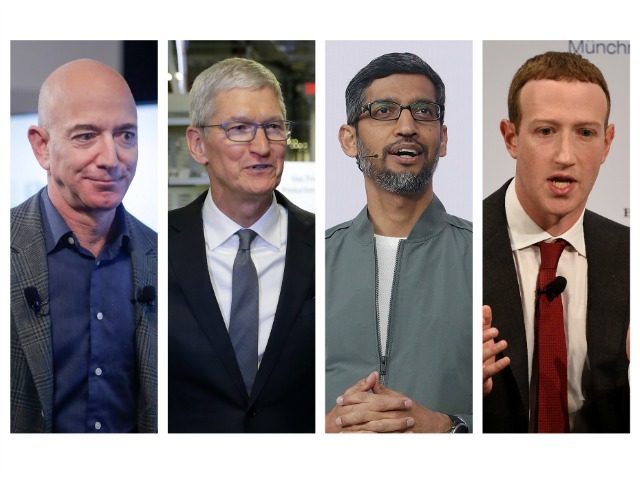Internal Emails Shed Light on Big Tech’s Abusive Business Practices

A recent report from NBC outlines what a huge number of emails from tech giants Amazon, Apple, Facebook, and Google could mean for possible antitrust cases against the companies.
NBC New York writes in an article titled “What a Trove of Emails From Facebook, Amazon, Apple and Google Could Mean for Potential Antitrust Cases,” that following the recent testimony of the CEO’s of Amazon, Apple, Facebook, and Google, internal emails obtained by Congress as part of an antitrust probe into the firms provide even further insight into the operations of the tech giants.
A curated selection of 1.3 million internal documents released by the House Judiciary Committee’s antitrust panel are part of a year-long investigation into the tech firms and include emails and chat logs between executives at the firms.
The documents reportedly show the companies strategizing ahead of major company decisions, such as Facebook’s $1 billion acquisition of Instagram or Amazon’s decision to undercut the price of diapers to compete with Diapers.com.
Alicia Batts, a partner in the antitrust and competition practice at Squire Patton Boggs, commented that its not uncommon for these sort of documents to surface in a merger investigation. “It’s an indication to look deeper but not necessarily an indication you won’t be able to close [the deal],” she said in an interview with CNBC. “When you have both documents that show a company is planning to harm competition and the economic data or the economic model support that it’s possible, that’s when the documents are given the most weight.”
NBC outlined some of the most interesting revelations from the documents relating to each of the companies, several of which can be found below:
– Instagram co-founder Kevin Systrom feared Zuckerberg entering “destroy mode” if he didn’t sell: As Zuckerberg began to court Instagram for a potential deal, Systrom messaged one of his investors, Benchmark Partner Matt Cohler, in February 2012 for advice on how to politely rebuff an offer. Systrom seemed adamant in wanting to stay independent to see how far he could take Instagram on his own. But he wanted Cohler’s advice on whether Zuckerberg would “go into destroy mode” if he rejected an offer.
″[P]robably,” Cohler responded, ”(and probably if we just don’t engage at all).”
Amazon
– Amazon undercut Diapers.com’s prices before buying it:A top executive, then-vice president of worldwide corporate development Douglas Booms, identified Diapers.com as Amazon’s ”#1 short term competitor” in a 2009 email. “As I’ve mentioned to each of you, I think, we need to match pricing on these guys no matter what the cost,” Booms wrote.
Apple
Apple argued to Congress that it “treats every developer the same,” and that “the rules apply to everyone.” But its internal messages show otherwise. As previously reported by Breitbart News, Apple offered a sweetheart deal to Amazon to get its Amazon Prime Video app on Apple Devices. The proposed deal included Apple charging a far lower percentage to Amazon than to typical app developers.
– Executives saw a potential deal with YouTube as a way to prevent Yahoo from buying it: As Google executives pondered whether to buy YouTube, one key consideration appeared to be thwarting Yahoo from snatching up the video service.
Huber, the SVP of geo and commerce at the time, wrote in a 2005 email, “I think we should talk to them, if nothing else to make it more expensive for Yahoo. They’ll also eventually need a monetization/ads model, so we should use ours instead of anything from Yahoo (if they don’t go acquisition soon, and we maintain reasonable relations with them).”
Read more at NBC New York here.
Lucas Nolan is a reporter for Breitbart News covering issues of free speech and online censorship. Follow him on Twitter @LucasNolan or contact via secure email at the address lucasnolan@protonmail.com
No comments:
Post a Comment